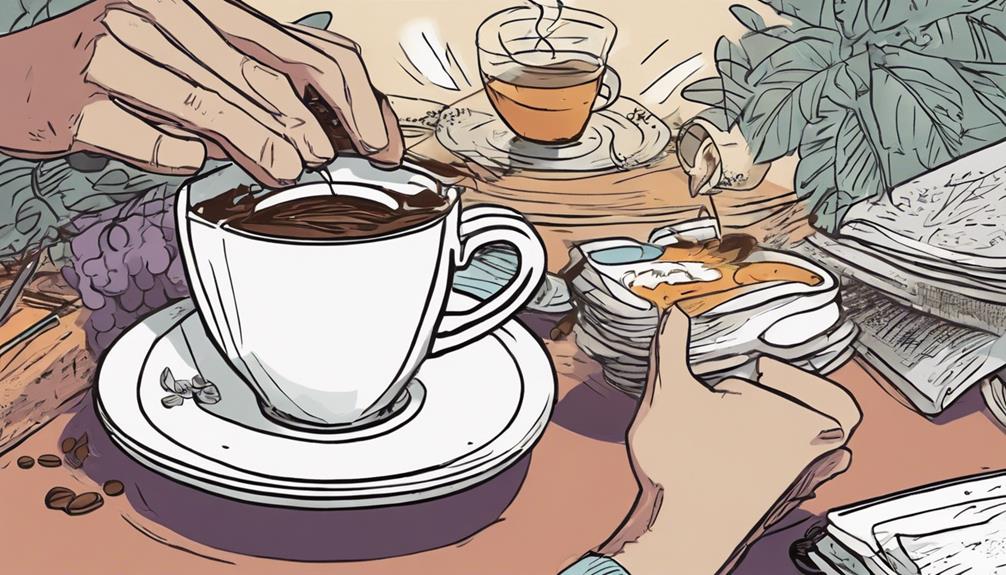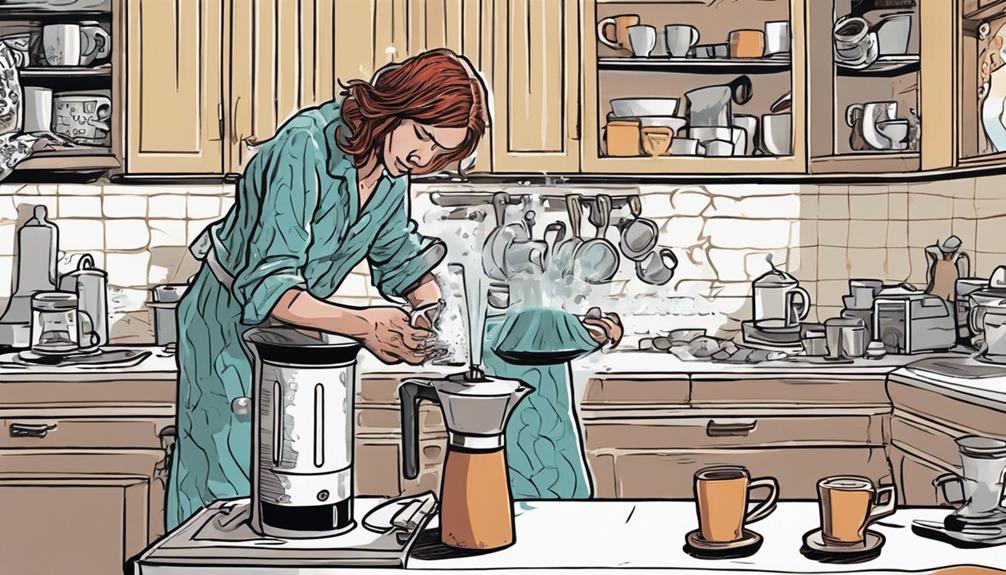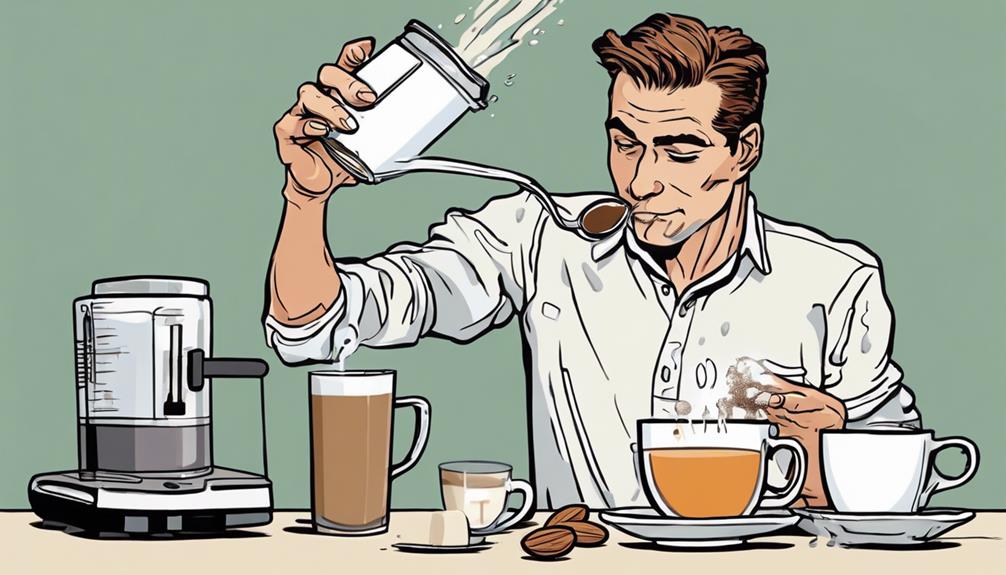Are you prepared to say goodbye to coffee in favor of a healthier lifestyle? Begin by slowly decreasing your intake and experimenting with alternatives such as dandelion tea or other herbal options. Establish boundaries and engage in positive activities to overcome cravings. The advantages of making this switch include improved sleep, reduced anxiety, and better overall well-being. Try out tasty substitutes like turmeric coconut milk lattes to keep things interesting. Take Ayurvedic principles into consideration for a well-rounded transition. Start your path to wellness by ending your reliance on coffee – discover additional tips for a successful journey.
Key Takeaways
- Gradually reduce coffee intake to form new habits and minimize withdrawal symptoms.
- Substitute coffee with alternatives like dandelion tea or herbal teas.
- Incorporate activities like exercise to combat coffee cravings.
- Set limits on coffee consumption to prevent negative health impacts.
- Seek support and guidance to successfully break the coffee addiction.
Coffee Addiction: Understanding the Dependency
If you find yourself reaching for 2-3 cups daily and experiencing intense withdrawal symptoms when you try to quit, you may be facing a coffee addiction that needs understanding and addressing. Dependency on coffee can lead to disruptions in sleep patterns, increased anxiety levels, and a persistent need for the beverage throughout the day.
The addictive nature of coffee can affect your energy levels, causing crashes and impacting your daily routines. Planning your day around coffee consumption may indicate a severe attachment to the drink, highlighting the depth of the dependency.
Moreover, severe coffee addiction can result in sleep disturbances, heightened anxiety, and an overall negative impact on your mental and physical health. It's essential to recognize the signs of coffee addiction and take steps to address this dependency before it escalates further.
Understanding the effects of coffee addiction is the first step towards breaking the cycle and regaining control over your habits and overall well-being.
Breaking the Habit: Tips for Success

To successfully break the habit of coffee addiction, implementing effective strategies is key to reclaiming control over your consumption patterns and overall well-being. Start by gradually reducing your coffee intake to form new habits and minimize withdrawal symptoms.
Consider substituting coffee with alternatives like dandelion tea, coconut water, or herbal teas to ease the shift away from coffee. Additionally, incorporating activities such as exercise and positive distractions can help combat cravings for coffee.
Setting limits on coffee consumption is essential to prevent negative impacts on your health and well-being. It's also vital to listen to your body and pay attention to how it responds when cutting back on coffee, allowing you to make informed decisions along the way.
Health Benefits of Quitting Coffee

Quitting coffee can lead to a range of health benefits, including improved sleep quality, reduced anxiety, and enhanced hydration levels. When you cut down on your coffee intake, you may notice that you sleep more soundly and wake up feeling more refreshed.
Anxiety levels often decrease as well, as caffeine can sometimes exacerbate feelings of nervousness and restlessness. Additionally, giving up coffee can improve your hydration levels, reducing the risk of acid reflux and promoting overall better digestion.
Another positive effect of breaking up with coffee is the potential for healthier teeth. By ditching coffee, you can prevent staining and decrease the acidity exposure to your teeth and gums, which can contribute to a brighter smile and stronger dental health.
Embracing these changes post-coffee can lead to a more balanced lifestyle that benefits your physical and mental well-being.
Alternatives to Replace Coffee

Consider exploring a variety of beverages as you seek alternatives to replace coffee in your daily routine.
Roasted dandelion tea stands out as a liver detoxifying option that can mimic the rich flavor of coffee.
Turmeric coconut milk lattes offer a luxurious and flavorful replacement, perfect for those craving a decadent coffee alternative.
Green tea, known for its lower caffeine content and calming effects due to L-theanine, serves as a soothing substitute for coffee. Making the switch from coffee to green tea allows you to observe how your body responds to the change, aiding in the shift process.
By experimenting with different coffee alternatives, such as herbal teas, you can find beverages that align better with your personal preferences and health objectives.
Embracing these alternatives and switching up your habits gradually can help make the adjustment away from coffee smoother and more enjoyable.
Ayurvedic Insights on Coffee Consumption

Exploring Ayurvedic insights on coffee consumption reveals how different doshas react to this beverage and the importance of balancing intake based on individual constitution.
Ayurveda views coffee as heavy, heating, and stimulating, potentially causing imbalance depending on your dosha. Pitta and Kapha doshas usually tolerate the bitter taste better than the Vata dosha.
To balance coffee consumption, Ayurveda suggests considering your dosha, the timing, and the way you consume it. Vata dosha can be aggravated by coffee, especially on an empty stomach, but adding milk or having it after food can help balance its effects.
Understanding how coffee impacts doshas aids in making informed choices aligned with your Ayurvedic constitution. By being mindful of your dosha and how it interacts with coffee, you can navigate your consumption in a way that supports your overall well-being and balance.
Journey to Wellness Without Coffee

Understanding the impact of quitting coffee on your wellness journey can reveal remarkable insights into your overall health and well-being.
When Erin decided to quit coffee, she experienced a significant reduction in her anxiety levels within just three days. However, the detox process wasn't all smooth sailing; Erin faced moodiness, aggravation, and fatigue. Despite these challenges, breaking up with coffee brought greater ease into her life, particularly in managing excess vata according to Ayurvedic principles.
Even though Erin still harbors a love for coffee, she acknowledges feeling better without its daily consumption. She noticed improvements in her sleep quality and appetite.
This journey to wellness without coffee hasn't only positively impacted Erin's anxiety levels but has also shed light on the benefits of managing vata through dietary choices. Erin's experience serves as a confirmation to the transformative power of making conscious choices for your well-being.
Self-Reflection and Personal Growth

How can self-examination of your relationship with coffee lead to personal growth and positive lifestyle changes?
By analyzing your dependencies and harmful habits regarding coffee consumption, you can uncover areas for improvement and commence on a journey of self-discovery. Self-reflection is a powerful tool for recognizing patterns that may be negatively impacting your well-being. Understanding the hold that coffee addiction may have on your life can pave the way for personal growth and positive transformations.
Through introspection, you can identify the emotional and physical dependencies you may have developed towards coffee. This awareness enables you to make empowering decisions to break free from harmful attachments and embrace change. By questioning your personal connections and routines surrounding coffee, you gain insight into your relationship with this beverage and open doors to self-improvement.
Self-reflection is the key to unraveling the intricacies of your coffee consumption and fostering personal growth. Embrace this process as a stepping stone towards a healthier and more fulfilling lifestyle.
Empowering Decisions for Well-Being

Analyzing your relationship with coffee can empower you to make decisions that enhance your overall well-being and quality of life. If you find yourself relying on that morning cup of coffee for a boost, consider the impact it might be having on your hydration levels, anxiety, and sleep quality.
Switching to green tea, which contains less caffeine and offers various health benefits, could be a positive step towards a healthier lifestyle. Being committed to getting in tune with your body's needs and making choices that prioritize feeling good can help you avoid triggers that intensify coffee cravings.
Frequently Asked Questions
How to Break up With Coffee?
To break up with coffee, start by gradually cutting back your intake. Switch to herbal teas or matcha green tea. Stay hydrated, exercise lightly, practice deep breathing, and establish a calming bedtime routine to help manage withdrawal symptoms.
How Long Should a Coffee Break Last?
For a quick mental and physical recharge, your coffee break should last between 15 to 20 minutes. Short breaks boost productivity and focus better than long ones. Take one every 2 hours for sustained energy.
Does Taking a Break From Coffee Help?
Taking a break from coffee can help reset your body's caffeine tolerance, improve sleep quality, and reduce anxiety levels. Gradually cutting back on intake can lead to enhanced hydration, better digestion, balanced energy levels, and mental clarity.
What Happens to Your Body When You Stop Drinking Coffee?
When you stop drinking coffee, your body may experience reduced anxiety, improved sleep, and better appetite regulation. Breaking up with coffee can lead to greater ease, decreased moodiness, and fatigue during the detox process.
Conclusion
You've made the decision to break up with coffee, and that's a huge step towards a healthier lifestyle. If you’ve been relying on coffee to get you through the day, it may take some time for your body to adjust to the change. However, by cutting out caffeine, you may notice improvements in your sleep, energy levels, and overall well-being. And if you’re worried about missing out on social interactions over a cup of coffee, consider exploring different ways to connect with others, such as inviting your crush for a walk or finding new hobbies together. If you’re wondering how to ask your crush for coffee, consider suggesting a different activity that aligns with your values and goals.
While you may worry about feeling sluggish without your daily caffeine fix, remember that there are plenty of energizing alternatives out there waiting to be discovered.
Embrace this change as an opportunity to explore new flavors, boost your overall well-being, and experience a renewed sense of energy.
You've got this!









